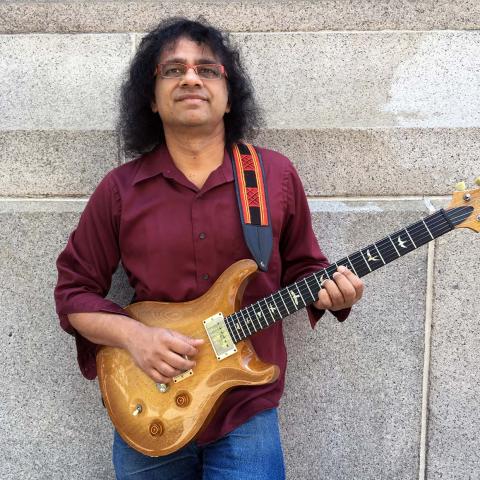Alumni Profile: Prasanna '99

Prasanna
Roger Zuniga
After hearing Prasanna’s guitar playing, my first impression was that I’d never seen or heard anyone approach the instrument as he does. The seemingly endless variety of long and short glissandi and other left-hand inflections in his solos derived from Carnatic music (the genre of classical music from southeastern India where Prasanna grew up) give his playing a most exotic sound. But also in the mix are guitar techniques that are the staples of Western rock, blues, funk, and jazz.
The amalgam of musical sounds in the air in Prasanna’s childhood home in Ranipet, India, included Carnatic vocal music sung by his younger sister, the radio playing songs written by Illaiyaraja for Tamil and Bollywood films, and his dad’s collection cassettes of Western pop songs by Toto, the Bellamy Brothers, the Pointer Sisters, and others.
“I started playing semi-professionally when I was 13,” Prasanna says during a call from his New York apartment. “We played a lot of film music covers. The music of Illaiyaraja was like that of Michael Jackson in my area.” Around that time MTV became very big in India and exposed Prasanna to many more Western artists and his band’s play-list grew to include songs by Dire Straits and the Police. He also began checking out heavier rock bands including Scorpions, Deep Purple, and Led Zeppelin, but Santana ultimately became a link between Eastern and Western music for Prasanna.
“Santana’s playing was so melodic and lyrical,” he says. “Somehow I connected it to Indian music. I was learning Carnatic music from my sister’s guru and playing it on the guitar, very formal and serious. But I was also playing metal and absorbing the compositional things going on in film music. The musical types mixed together, it was all just music to me.”
A student with a bright academic future, Prasanna was accepted to the prestigious Indian Institute of Technology following high school. “For an Indian kid to get into that school meant that you would be set for life,” he says. “The acceptance rate is about 2 percent.” While studying naval architecture at IIT, he continued his musical explorations of the blues as well as progressive rock, and then jazz, beginning with Steely Dan and progressing to Chick Corea and Pat Metheny.
“I finished at IIT, but I didn’t want to do what my peers were doing and get a fellowship at Cornell or MIT. I wanted to go to Berklee,” he says. “Someone told me that Donald Fagen, Al DiMeola, and others went to Berklee, and I had to go there. I needed an environment where I could play with other people and experiment with Carnatic ragas in jazz. Berklee was very welcoming and I found that there was a decent awareness of Indian music among the faculty.”
Prasanna’s focus at Berklee was jazz and classical composition, but at the same time he dug deeper into his Indian music background as he developed his musical voice. As a student, his calendar was filled with concert dates across the country. “The Carnatic scene in America opened up for me,” he says. “Sometimes the audiences were primarily Indian, but when I played at colleges there was a more diverse crowd.” He made it a practice to always surround himself with the best players possible. “After I graduated from Berklee, I had an opportunity to play at a cultural festival at IIT,” he recalls. “I got Alfonso Johnson and Kenwood Dennard to do the show with me in Chennai, India. I wanted to push myself, and it was awesome.”
In the 16 years since he left Berklee, Prasanna has moved among a diverse group of musicians playing on celebrated soundtracks by Indian film composer A.R. Rahman, jamming with American rockers Alec Skolnick and Vernon Reid, and playing jazz fusion with Steve Smith ’76, Victor Wooten, and others. He’s recorded 16 ambitious albums to date as a leader, including his latest, All Terrain Guitar.
The new outing explores the rock, jazz, and Indian influences in Prasanna’s playing and writing. The album’s musicians include trumpeter Dave Douglas, saxophonists Rudresh Mahanthappa ’92 and David Binney, pianist Vijay Iyer, drummers Rodney Holmes and Mauricio Zottarelli ’02, bassists Mike Pope and Bill Urmson, and vocalists Shalini Lakshmi (Prasanna’s wife), and Natalie John. Prasanna’s multi-hued guitar is the album’s unifying force, yet he shares the spotlight liberally with his soloists.
Among the many standout tracks are the uptempo “Springtime in New York” with its fleet-fingered bass and guitar melody. “Song of the Wind” has an angular bass ostinato figure underpinning a raga sung by Shalini Lakshmi in unison with Prasanna’s guitar. Vijay Iver offers a spacey and enigmatic solo piano on “31” before Rodney Holmes kick’s into the tune’s jazz-rock groove. Prasanna’s heavily distorted guitar is at center stage in “Lava,” a four-minute solo piece that pushes deeply into Carnatic musical territory despite an instrumental timbre atypical for that genre.
Prasanna came up with the album’s title while dune busting in Dubai thinking of all the musical styles and genres of which guitar is a part. “Guitar is such an omnidirectional instrument,” he says. “To really function in this world, a guitarist has to be open because the instrument demands a greater level of openness than any instrument I know of.
“When I record, I think of movies and journeys. On a flight, if you look out the window, you may see mountains, flat land, and then glaciers. For me, this record is like that in music.” In Prasanna’s hands, the guitar transports listeners to vistas that are simultaneously curious and magnificent.




